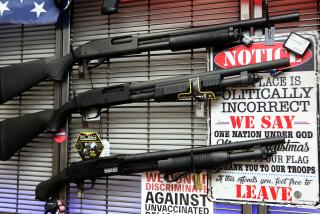PERSPECTIVE ON SMOKING : Bans Alone Won’t Win the War : Raise the federal tax $2 per pack and watch the market shrink 23%; even better, teens will be priced out of starting.
- Share via
The ban on smoking in Los Angeles restaurants, signed into law Thursday, is a big victory for restaurant patrons and employees and may even have a marginal impact on reducing smoking among adults. It will not, however, diminish the industry’s ability to attract new smokers. To reduce new recruits, the price of tobacco must be elevated beyond the reach of teens. Boosting the tobacco-tax is the best method yet tried for discouraging teen smokers, and the threat of a major federal tax increase has the industry in full-scale mobilization.
If President Clinton succeeds in boosting the federal tax on a pack of cigarettes by $2, Americans in record numbers will stop smoking, cut back or simply not start. An estimated 5 1/2 billion fewer packs of cigarettes will be consumed, squeezing not just tobacco company profits but state and local budgets as well. States and localities desperately need the $6 billion they receive from local tobacco-tax revenues. They will be under great fiscal pressure to raise their tobacco taxes just to keep revenues even.
A growing movement of health advocates, following the examples set by successful tobacco-tax initiatives in California and Massachusetts, will add to the pressure to increase state tobacco taxes. Initiative advocates would reserve a portion of the new tax revenues for education, prevention and high-impact anti-tobacco commercials on TV.
The tobacco industry will fight federal and state tax increases at every step, but the industry is weaker now than it has been. The President is their outspoken opponent. Popular support for increases in federal excise taxes on cigarettes is at record levels. The “be fair to smokers” argument relied on by Tobacco Institute lobbyists rings hollow now that we know smokers are giving the rest of us cancer. Almost lost in the catalogue of bad news for the tobacco industry is the domino effect that the federal tax increase is likely to have in triggering additional state tobacco-tax increases.
A $2-a-pack federal tax increase would result in a 23% reduction in smoking across the nation, according to conservative estimates from the Coalition on Smoking or Health. In California, this means nearly half a billion fewer packs sold and a drop of $165 million in California’s tobacco-tax revenues. In Arkansas, the reduction in state tobacco-tax revenue would reach more than $23 million. States cannot afford to lose this revenue, and will replace it through higher state taxes, most likely on tobacco.
Price hikes discourage tobacco consumption, but any single price increase will have only a limited effect. When those priced out of the market are gone, the rapid decline levels off. Health activists want to extend that sharp downward trend by using tobacco-tax revenues to pay for hard-hitting, teen-oriented anti-tobacco messages in the classroom, in the community and on television.
This approach worked in California when voters approved spending one-fifth of the revenues from a 25-cent tobacco-tax increase on anti-tobacco education. When television commercials and billboards went up a year and a half after the tax increase took effect, the impact was like another big price increase. Consumption fell dramatically for a second time, and only leveled off after the media campaign ended.
Reaching adolescents is the key to the success of this strategy. Teens will overwhelmingly make up the 5,000 new smokers the tobacco industry needs to recruit every day to replace those who quit or die from tobacco-related diseases. If teens are priced out of the market or turned off through mass-media communication, the market shrivels.
A national network of health advocates pushing these state tobacco-tax initiatives came together for the first time last month at a conference sponsored by the Sacramento Lung Assn. Representatives of the American Cancer Society, Lung and Heart associations plus government health officers from 20 states were in attendance. They learned how to prepare for and manage tobacco-tax initiative campaigns and what to expect from the tobacco industry.
The conference heard about some frightening tactics used by the tobacco industry to keep tax increases off the ballot in Arkansas and Nebraska. Ex-FBI agents, out-of-town lawyers and private investigators harassed petition circulators and signers. The tobacco industry investigators used threats and intimidation to unearth irregularities in the way signatures were collected. They succeeded. Courts in both states found that enough signatures were tainted by technical miscues to keep the measures off the ballot.
That mistake won’t happen again. The half-dozen states working to put a tobacco-tax initiative on the November, 1994, ballot are preparing for whatever the industry has to offer. The tobacco-tax battles have just begun, and the side that wins them wins the war.
More to Read
Sign up for Essential California
The most important California stories and recommendations in your inbox every morning.
You may occasionally receive promotional content from the Los Angeles Times.













